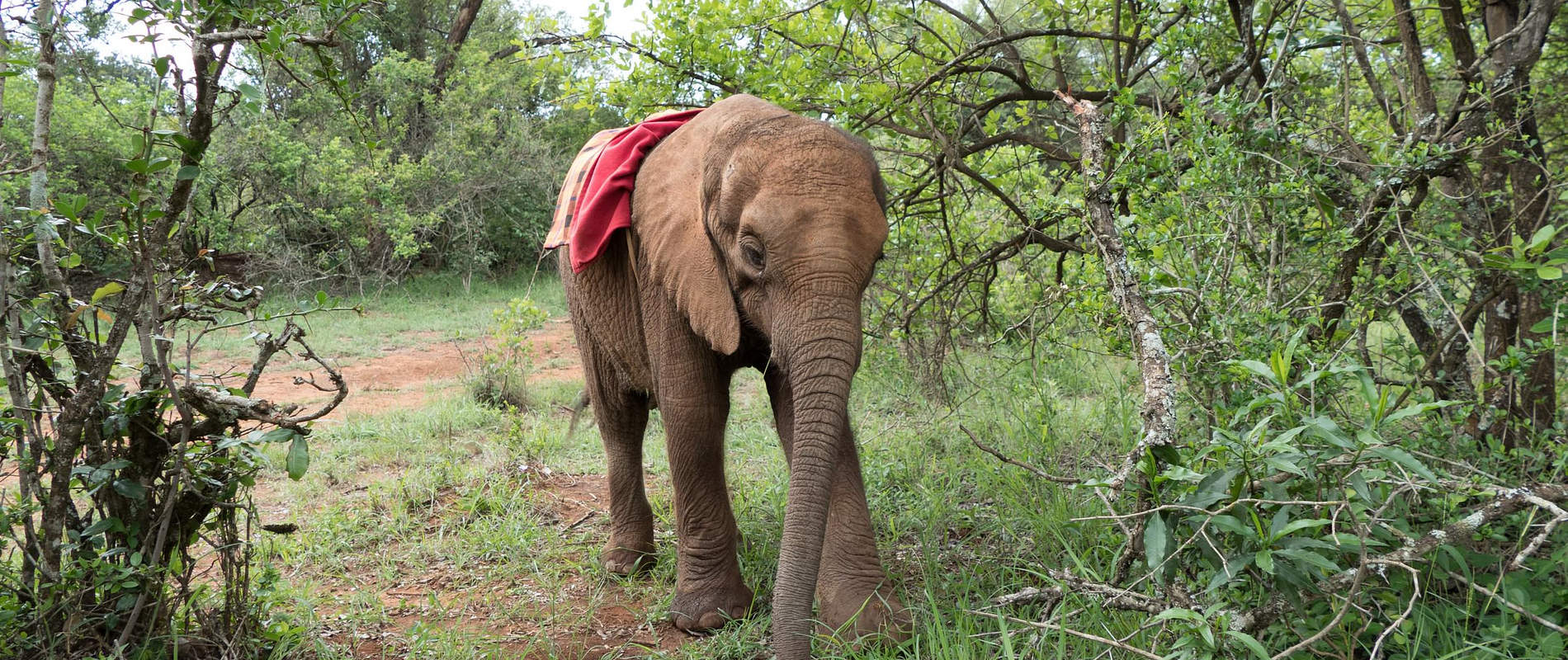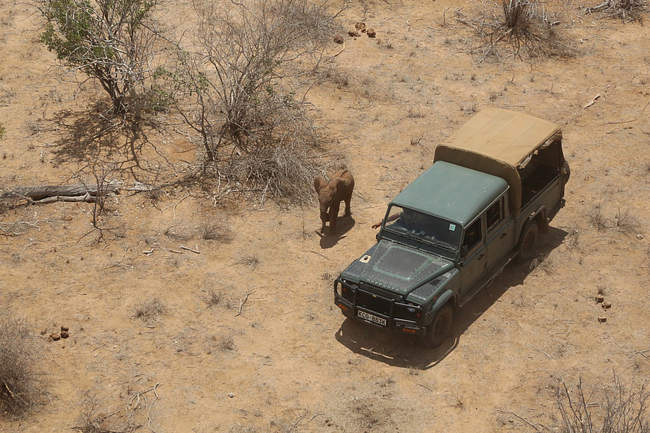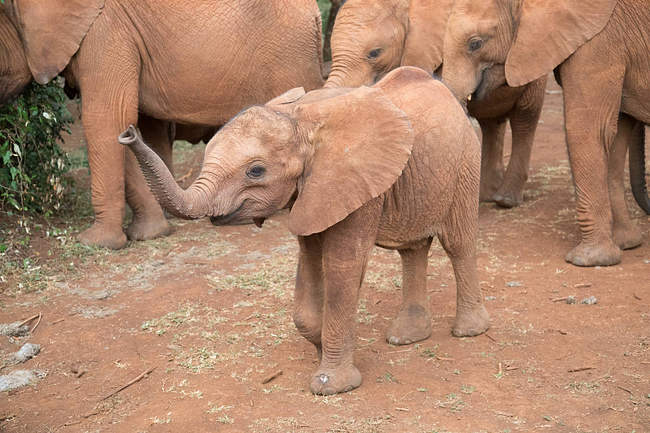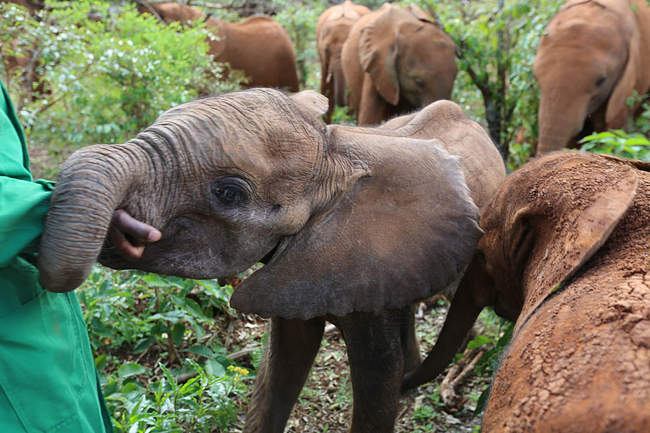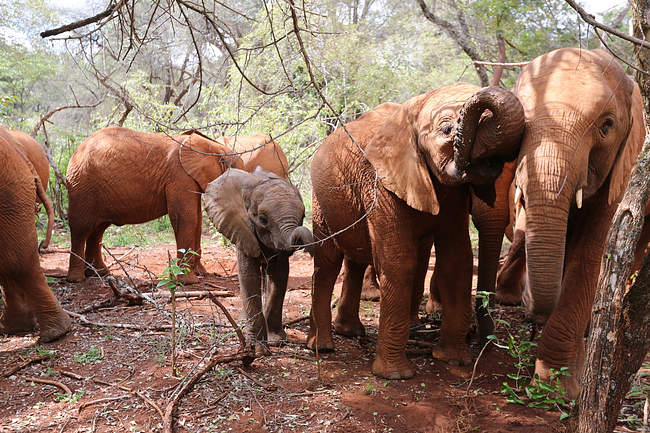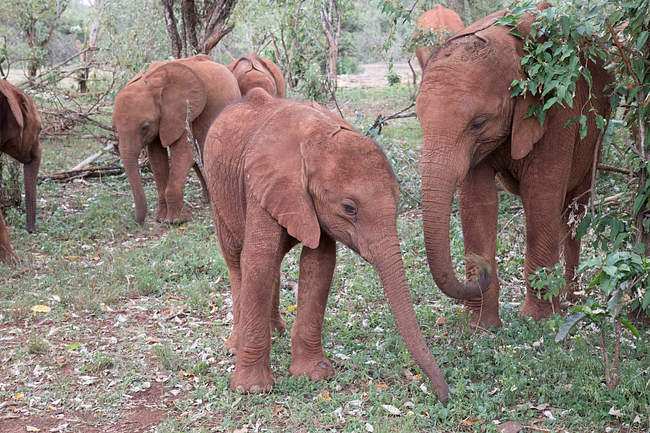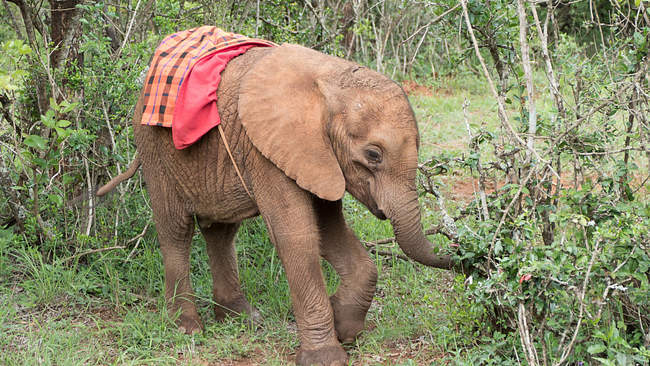Kiasa's story began with DSWT pilot Neville Sheldrick on a routine patrol flight in one of the Trust’s planes, heading to the Southern sector of Tsavo East National Park from the DSWT Kaluku headquarters. While on en route, in an area known as the triangle towards the Tsavo and Athi River junction, he noticed a tiny elephant calf escorted by two big bull elephants. He flew the area scouring for evidence of other elephant herds but sighted no other elephants in the area.
A few days earlier while on an aerial patrol Neville had reported the sighting of a dead female who had succumbed to the effects of drought not far from this very same location. Concerned that something was not quite right with this picture, he reported the matter to both the Kenya Wildlife Service and also our Kaluku operations room so that Andy Payne in the DSWT helicopter could come and take a closer look, to confirm that he was accurate in his assessment of the situation. GPS coordinates of the location of the two bulls and baby were shared while he continued on to complete his patrol further south where the drought had really taken hold, with numerous elephant dying as a result of a lack of food due to failed rains.

It was confirmed that they were indeed two bull elephants with a tiny baby and that there were no females or other elephants in the area. Neville coordinated with KWS Veterinary Officer Dr. Jeremiah Poghon working with the DSWT funded Mobile Veterinary Unit based in Tsavo, to be flown to the closest airstrip which was in fact on the north bank of the Galana River, and the Trust’s Mtito Desnaring team was directed to the location as well.
It was very clear that without mother’s milk this calf would most certainly die, as she was between five and six months old. The fact that so many elephants had succumbed to the effects of drought this year, and the location of the recently discovered carcass of a dead female, left little doubt that she was an orphan being cared for by these well-meaning gentle bulls, but sadly while they could give her the comfort and much needed protection from predators, they could not provide her with the milk to sustain life, and conditions still remained desperately dry.
Dr. Poghon was flown from the Voi headquarters by Neville back to the closest airstrip to the site, this was however quite a distance from where the trio of elephants were on the southern bank. On arrival they were met by the helicopter and flown to where the Mtito Team with their vehicle waited for guidance from the air. KWS Vet Dr. Poghon agreed that without a rescue this young baby would not survive, and flew around to confirm again that there were no other elephants within the area.
Given the open terrain it was not difficult to gently separate the bulls from the baby with the helicopter so that our ground team could drive up to the baby and capture her safely. She was still strong, but little time was wasted while we prepared the stretcher and tied her legs so that she could be safely loaded into the helicopter and flown directly to the Trust’s Nairobi Nursery. With the back seats removed there was ample space for the calf and a team member to sit in the back of the aircraft offering her comfort throughout the one hour flight.
Support our Orphans' Project
The helicopter was able to land at the Nursery and the keepers were on hand to quickly offload the little calf and while still on the stretcher, carry her to a prepared stable. She was desperately thirsty and gulped down fluids, both water and milk and even slept, seemingly exhausted from her ordeal. We placed her in a stable next to Maktao so in the evening when the others returned for the night she had elephant company and interaction that she found reassuring.
The very next day she was out in the company of the other orphans and while they showed great interest in the new arrival she remained aloof and distant, and this is something we often see with orphans of this age, approximately six months old, who miss their lost elephant family and grieve for such a long time, so while they mix with the others they remain separated due to sadness and mourning.

It is the human family that are so important during this time as well, providing the attention and love and the gentle tactile care that baby elephants crave so much, so it is no surprise that Kiasa has become completely hooked on her Keepers. Maktao, the other baby in our midst who is hooked on the Keepers too, can at times get possessive and jealous, but Kiasa is not faint hearted and despite his spirited disapproval she ignores him and stands her ground. For weeks she would try to return to the stockades during the day, sneaking away from the group to do so, but over the months she has settled into the routine, with Tagwa paying her close and special attention.
Physically Kiasa has thrived in our care, growing fat and strong, and we are happy to report even her emotional scars are healing fast and she is now interacting with the group more comfortably and playing exuberantly in the midday mud bath, often choosing to spray the midday visitors with mud for fun!
